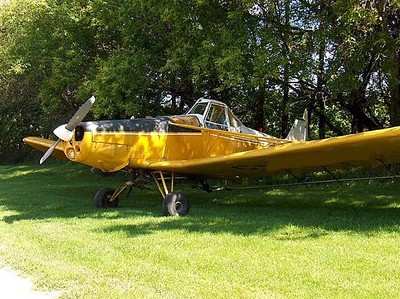Mon, Nov 08, 2004
TSA Issues Alert For Stolen Aircraft
A crop dusting aircraft was stolen from Ejido Queretaro, near
Mexicali, Mexico and has now become the subject of an intensive TSA
search. Although there is currently no indication that this has any
connection to terrorist activity, the theft is cause for concern.
Past information indicates that members of al-Qaida may have
planned—or may still be planning—to disperse biological
or chemical agents from crop dusting aircraft.
The stolen aircraft has been identified as a Piper PA 25,
Pawnee. It is registered in Mexico and bears the tail number XBCYP.
If you see the aircraft described above, you should immediately
contact the TSA General Aviation Hotline at (866) 427-3287.

Law enforcement agencies continue to investigate suspicious
incidents and inquiries involving crop dusters and spray equipment.
In September 2001, the National Agricultural Aviation Association
issued an advisory to its members. The advisory warned members to
“be vigilant to any suspicious activity relative to the use,
training in or acquisition of dangerous chemicals or airborne
application of same including threats, unusual purchases,
suspicious behavior by employees or customers, and unusual contacts
with the public.” The advisory also instructed individuals to
report any suspicious circumstances or information to local FBI
offices.
TSA wants to remind aerial application operators and airport
operators to review the security measures contained in the TSA
Information Publication, Security Guidelines for General Aviation
Airports and the National Agricultural Aviation Association
security measures. For example, aerial application operators and
airport operators are encouraged to consider the following:
- Store aircraft and crop protection products in locked hangars
with electronic security systems when not in use.
- Park and disable loader trucks, forklifts, or other equipment
to block aircraft.
- In cases where the aircraft must be left outdoors, use
propeller locks, propeller chains or tiedowns on aircraft.
- Remove batteries from planes and disassemble engines from
unused aircraft.
- Install hidden security switches to prevent unauthorized
startup of the aircraft.
- Outdoor security lighting around hangars and operations is
encouraged.
- Establish contact with Federal and local law enforcement
agencies to coordinate responses to security breaches at
agricultural aviation facilities.
- Encourage operators to list the appropriate law enforcement
agency telephone numbers in a prominent place within their
operations.
If you see anything suspicious, report it immediately to local
law enforcement and the TSA General Aviation Hotline at 866-GASECUR
(866-427-3287).
More News
Local Airport Advisory (LAA) A service available only in Alaska and provided by facilities that are located on the landing airport, have a discrete ground-to-air communication freq>[...]
Also: Cosmonaut Kicked Out, Airbus Scales Back, AF Silver Star, Russian A-60 Clobbered A Samaritan’s Purse humanitarian flight was hijacked on Tuesday, December 2, while atte>[...]
Aero Linx: Michigan Helicopter Association (MHA) The Michigan Helicopter Association (MHA) exists to bring together people who share an interest in helicopters, including private, >[...]
Also: Airbus Acquisition, USCG Helo Sniper, Remember Pearl Harbor, New Thunderbird 1 Gulfstream’s newest addition to its next-gen lineup, the super-midsize G300, is officiall>[...]
Also: Electra Goes Military, Miami Air Taxi, Hypersonics Lab, MagniX HeliStrom Amazon’s Prime Air drones are back in the spotlight after one of its newest MK30 delivery drone>[...]
 ANN's Daily Aero-Term (12.14.25): Local Airport Advisory (LAA)
ANN's Daily Aero-Term (12.14.25): Local Airport Advisory (LAA) Airborne 12.08.25: Samaritans Purse Hijack, FAA Med Relief, China Rocket Fail
Airborne 12.08.25: Samaritans Purse Hijack, FAA Med Relief, China Rocket Fail ANN's Daily Aero-Linx (12.15.25)
ANN's Daily Aero-Linx (12.15.25) Airborne 12.10.25: New Gulfstream, ATC Integrator, Outrageous FFZ User Fees
Airborne 12.10.25: New Gulfstream, ATC Integrator, Outrageous FFZ User Fees Airborne-NextGen 12.09.25: Amazon Crash, China Rocket Accident, UAV Black Hawk
Airborne-NextGen 12.09.25: Amazon Crash, China Rocket Accident, UAV Black Hawk



